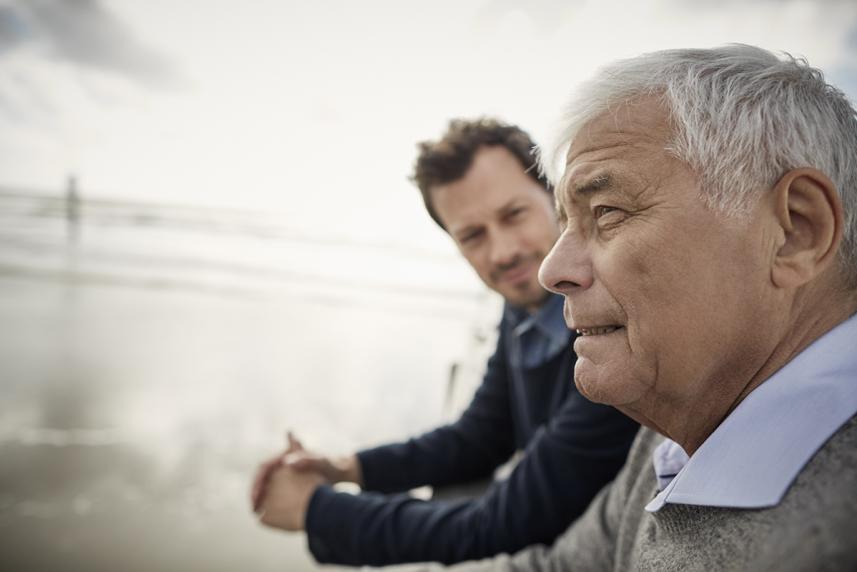
The Blue KC Care Management app makes it easy to get your questions about cancer answered. Download it now and use access code kclinksupport to connect.
These steps can help you manage your emotions and prepare for the road ahead.

A lung cancer diagnosis can bring a range of emotions. You need to wrap your head around your new normal, and you may feel uncertain about what comes next. But it’s important to keep in mind that you’re not alone.
About 238,000 people in the United States will be diagnosed with lung cancer in 2023, according to the American Cancer Society. It’s the second most common cancer in men and women (not counting skin cancer).
And with new treatments, people with lung cancer are living longer and better lives, says the American Society of Clinical Oncology (ASCO). Your team of doctors, nurses, and other lung cancer experts will be there for you throughout your treatment.
Plus, there are simple things you can do yourself to feel better. That can help take away some of your worries as you start on your treatment journey. Here are steps you can take right now.
This can be an emotional time. You might be feeling worried, fearful, or uncertain about your next steps. That’s only natural. A recent study in the journal Cancer Nursing found that almost 7 in 10 people who were recently diagnosed with lung cancer were scared. About half were depressed or anxious. It’s okay to feel those emotions. But it can help to find ways to cope with them. Try these strategies:
“Having a support group of peers can help you get through your cancer journey,” says Dhruv Bansal, M.D. He’s an oncologist at St. Luke’s Health System in Kansas City, Missouri. “Their experiences can help you manage your own and increase the chances of a successful outcome.”
Some ways to find a support group:

The Blue KC Care Management app makes it easy to get your questions about cancer answered. Download it now and use access code kclinksupport to connect.
Educating yourself about lung cancer can help you feel more in control. Don’t be afraid to ask your doctor questions if you don’t understand the details of your diagnosis. You can also do online research. Just be careful about where you find your information.
“The internet has made information available at our fingertips.” Dr. Bansal says. There is plenty of material out there, but a lot of it may be wrong or even dangerous. That’s why it’s key to go to trusted sources, says Dr. Bansal. He recommends these websites:
Plan on different appointments in the coming days and weeks. First, visit with your medical oncologist (a doctor who specializes in treating cancer). They’ll be the quarterback for your lung cancer care, explains Dr. Bansal. Your oncologist will also refer you to other specialists. They could include:
You may spend a lot of time with different members of your care team over the next weeks and months. They will work together to make sure you get the best treatment possible.
Your cancer diagnosis may have left you feeling stressed out. And the weeks and months ahead will bring other challenges too. That makes physical activity and a nutritious diet more important than ever, because it can keep your body strong.
For lung cancer, movement is good medicine. Studies show that it can be a good way to reduce tiredness, according to research published in The Oncologist. It can improve the way your lungs work, and it helps build up your muscles. Plus, it’s a mood booster. Your care team can work with you to develop an exercise plan, even if it’s just a daily walk.
Good nutrition is also important for patients diagnosed with lung cancer. According to the National Cancer Institute, malnutrition is common in people who have cancer. Research found that up to 7 in 10 patients treated for the most common form of lung cancer suffer from malnutrition or muscle loss. And another study showed that good nutrition helped those receiving immunotherapy do better.
Consider talking with your nurse or dietitian about a nutritious diet to help build up your strength now. As you begin treatment, they might suggest foods that can ease side effects. They might also have ideas about when to eat and how often.
Complementary therapies can help you relax and manage your stress as you begin your cancer journey. They can also reduce side effects during treatment and improve recovery, according to ASCO. Just be sure to talk to your health care team first. Research shows that these therapies (and others) may improve the quality of life of cancer patients.
Additional sources:
Lung cancer statistics: American Cancer Society
Study on mental health and lung cancer: Cancer Nursing
Exercise and quality of life for lung cancer patients: The Oncologist
Nutrition and cancer care: National Cancer Institute
Types of complementary therapies: American Society of Clinical Oncology
Blue Cross and Blue Shield of Kansas City is an independent licensee of the Blue Cross and Blue Shield Association.